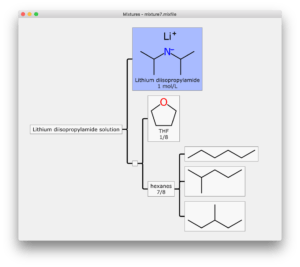SBIR to Further Develop “Mixtures InChI” (or MInChI)
Burlingame, California —September 6, 2018— Collaborative Drug Discovery, provider of CDD Vault web-based drug discovery informatics platform, announced they won a competitive, peer reviewed Phase 1 SBIR grant from NIH NCATS titled: “Digital representation of chemical mixtures to aid drug discovery and formulation”.
 Figure 1. A MInChI definition of LDA within a solvent mixture of THF and hexanes, in a ratio of 1 to 7.
Figure 1. A MInChI definition of LDA within a solvent mixture of THF and hexanes, in a ratio of 1 to 7.
Collaborive Drug Discovery, Inc. (CDD) proposes to develop a suite of software modules to enable scientists to unambiguously represent chemical mixtures in standard machine-readable formats, filling an urgent and widely-recognized need of scientists working to discover, develop, formulate, manufacture and regulate drugs, and the needs of support staff managing reagents, inventories and safety data sheets along the way. InChI – the International Chemical Identifier – has emerged over the past decade as the predominant international standard to concisely represent chemical structures as encoded text strings that computers can quickly index, sort, search, and compare. In practice, however, chemicals are typically formulated as mixtures. Even if a mixture consists of one principal ingredient that is well represented by an InChI identifier, the mixture may also contain solvents, adjuncts, cofactors, impurities, etc. that need to be properly recorded. A working committee of the International Union of Pure and Applied Chemistry (IUPAC) is close to formalizing “Mixtures InChI”, (or MInChI), which will extend InChI to become the first standard to encompass mixtures. MInChI will effectively index mixtures in the same way that InChI indexes individual compounds.
InChI provides a concise, canonical, and unique summary of a compound rather than a complete structural representation. Other formats, such as the venerable Molfile, hold the full structure information which can then be converted into an InChI identifier. Similarly, in order for MInChI to gain traction, new data structures and methods are needed to collect, parse, interpret, display, edit, organize and store the information to be converted into MInChI codes; retaining the additional important descriptive details that MInChI identifiers intentionally discard. We propose to develop this data structure – which we tentatively call “Mixfile” in analogy to Molfile – along with associated conversion routines and a visual editor essential to implement the MInChI standard. Dr. Alex Clark, a CDD scientist, is a member of the IUPAC/MInChI working committee which is encouraging CDD to address this critical prerequisite to adoption of MInChI. CDD commits to distribute these key infrastructural elements as open formats and open-source software.
About this grant
The Small Business Innovation Research (SBIR) is part of a program to enable sharing of biological data. Award Number #1R43TR002528-01 from National Center for Advancing Translational Sciences as described on NIH Reporter supports this project. This content is solely the responsibility of the authors and does not necessarily represent the official views of the National Center for Advancing Translational Sciences or the National Institutes of Health.
About Collaborative Drug Discovery, Inc.
CDD’s (www.collaborativedrug.com) flagship product, “CDD Vault®”, is used to manage chemical registration, structure activity relationships (SAR), and securely scale collaborations. CDD Vault® is a hosted database solution for secure management and sharing of biological and chemical data. It lets you intuitively organize chemical structures and biological study data, and collaborate with internal or external partners through an easy to use web interface. Available modules within CDD Vault include Activity & Registration, Visualization, Inventory, and ELN.
A complete list of >60 publications and patents from CDD can be found online on our resources page: https://www.collaborativedrug.com/pages/resources.
Media Contacts: Isaiah Hankel, PhD, Collaborative Drug Discovery, (650) 204-3084, marketing@collaborativedrug.com.
Other posts you might be interested in
View All Posts
CDD Vault Updates
4 min
April 25, 2025
CDD Vault Update (April 2025 #3): AI+ Folding and Docking
Read More
CDD Vault Updates
10 min
April 18, 2025
CDD Vault Update (April 2025 #2): Pharmacokinetic (PK) and Michaelis-Menten Kinetics (Km/Kd) Curve Fit Equations, Donut Charts, TIFF Image Previews, and Parallel Reactions
Read More
CDD Blog
3 min
April 14, 2025
Let’s Talk Security - Why a Bug Bounty May Be More Valuable Than a Penetration Test
Read More


